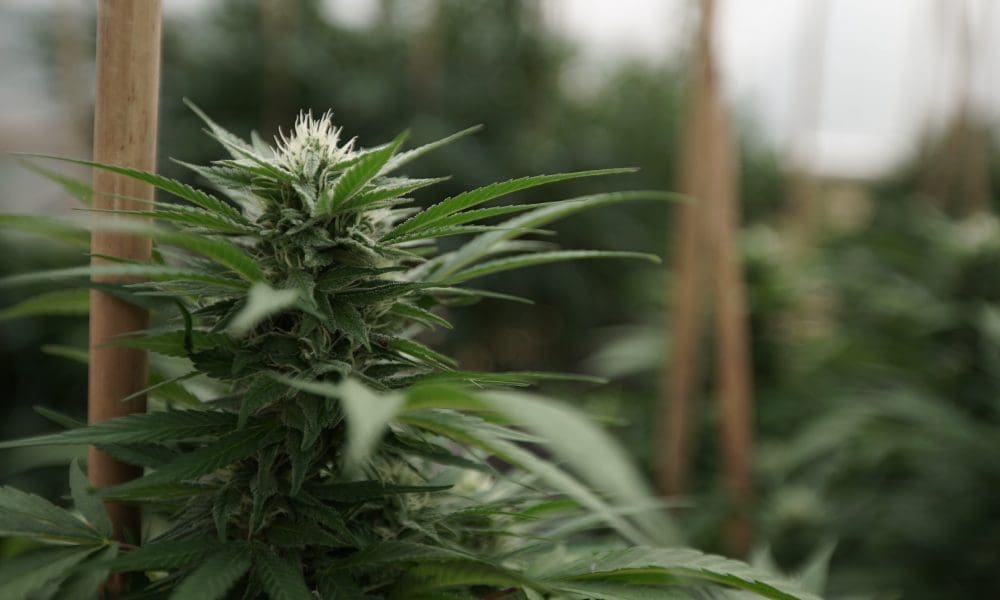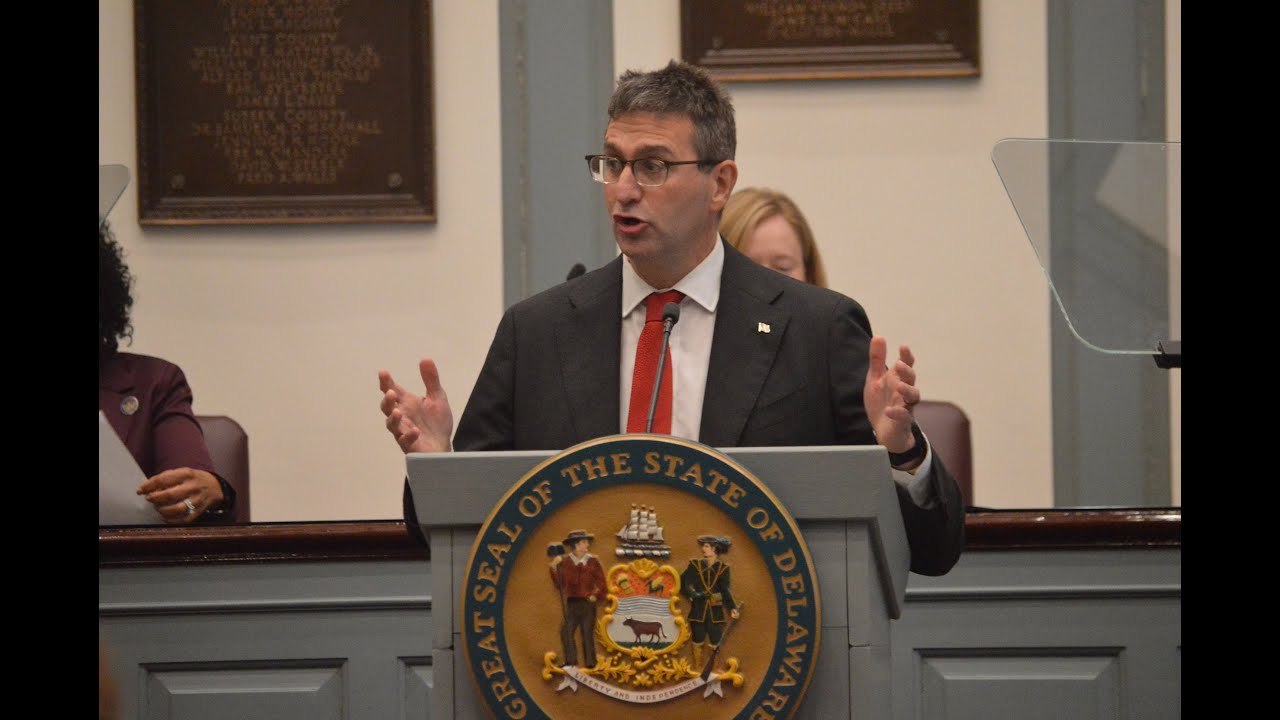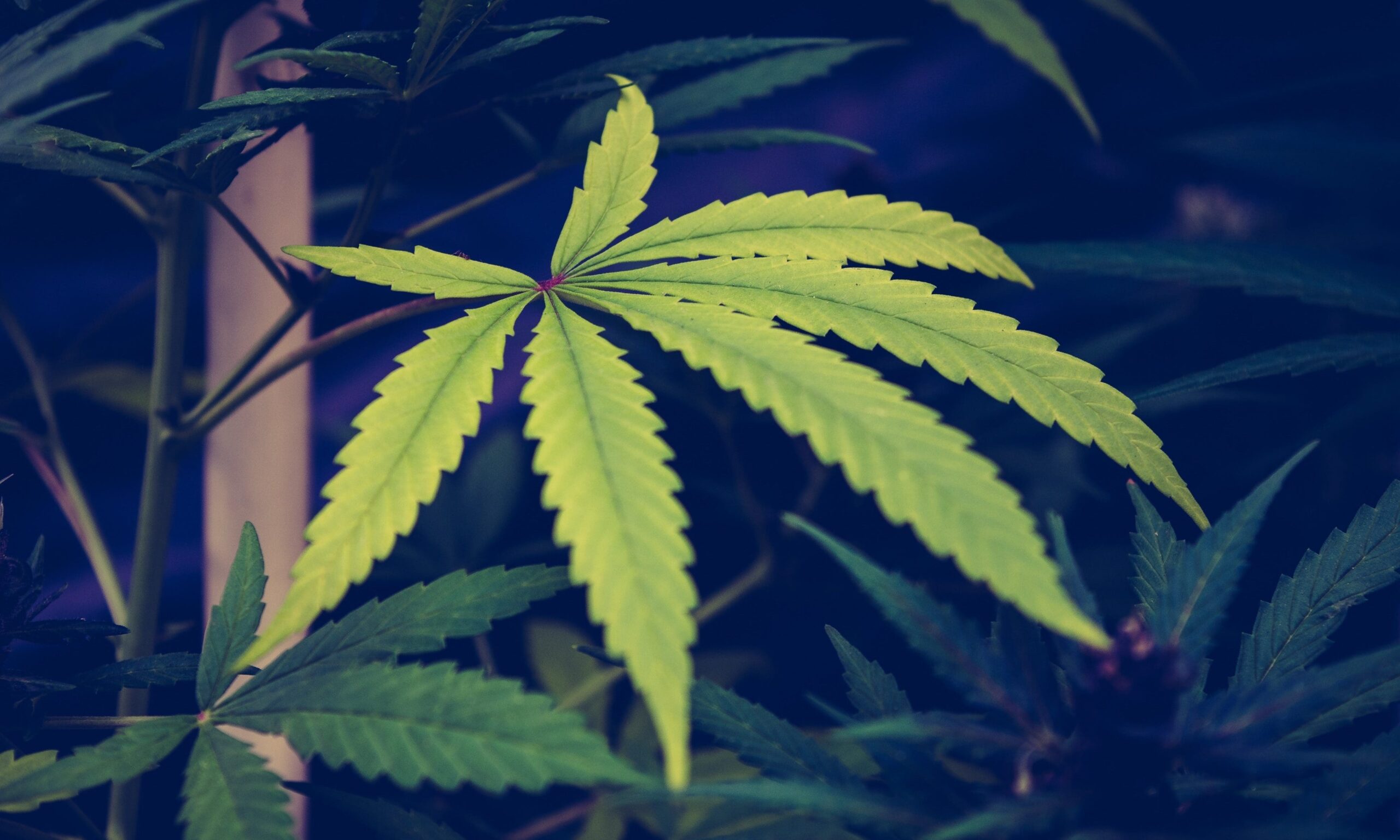featured
New Missouri Draft Marijuana Rules Target Predatory Licensing Practices, Hemp Recalls And Non-Compliant Business Owners
Published
6 days agoon

“It’s the things that we’ve learned over time and found it needed improvement or needed to be fixed. Hopefully we’re not missing anything.”
By Rebecca Rivas, Missouri Independent
Missouri cannabis business owners who have had their license revoked for violating state rules could be prohibited from getting another license under proposed rules announced by state regulators last week.
The Missouri Division of Cannabis Regulation released the draft of a massive overhaul of cannabis rules giving regulators more authority to address a range of issues, including predatory practices in the state’s social-equity cannabis licenses, product recalls involving hemp-derived THC and non-compliant owners obtaining other licenses.
“We have found over the years that there’s really not a lot of structure or authority in rule…for us to address individuals in ownership or potential ownership who have been found to be either violating regulations themselves or responsible for those who are violating rules,” Amy Moore, director of the division, told The Independent Friday. “We have found that that is a gap.”
Among the rule revisions, Moore said, is a requirement for businesses to have mechanisms in place to remove owners who are responsible for violating state regulations.
The changes cover so much ground, Moore said, because the division hasn’t made any rule alterations since the recreational marijuana constitutional amendment passed in 2022.
“It’s the things that we’ve learned over time,” she said, “and found it needed improvement or needed to be fixed. Hopefully we’re not missing anything.”
Aside from revisions, a brand new rule released Thursday would establish an unlimited number of research licenses to study cannabis in Missouri.
The public can submit the feedback on the division’s website until August 21, and regulators will then review them and decide if they want to formally submit the rules to the Secretary of State’s Office.
Moore said if her team decides to move forward, they would like to do it “quickly.”
“If I thought, ‘Okay, we’ve solved everybody’s concern’…we could have it done in a couple weeks,” she said, “but we want to be sure that we are open to all the feedback and that we really consider it all.”
Delta Extraction case
Nearly a year after the state stripped Robertsville-based Delta Extraction of its license in November 2023, regulators approved one of the company’s co-owners—AJO LLC—to take over a cultivation and manufacturing facility in Waynesville in May 2024. It’s a far bigger operation than Delta Extraction, and it also involves several dispensaries as well.
Lisa Cox, spokeswoman for the division, told The Independent in May that the rules currently do not prohibit individuals who have had a license revoked from acquiring another license.
Moore said Friday that the new rules would give the division “a much better standing” to deny an application for a license for an owner who’s been noncompliant previously.
She hopes it gives licensees “fair warning” when choosing future business partners.
“That’s part of why these new rules are so important,” she said. “This rule gives them a big heads up that that’s not going to work out for them, and they shouldn’t make that investment and get themselves tied up with individuals who have had previous non compliance.”
It also establishes an annual review of ownership for every license.
In February, Delta lost its appeal to get its license back, with Missouri’s administrative hearing commission concluding it had a “corporate culture of lax compliance with regulatory requirements.”
The scathing 137-page ruling, issued by Commissioner Carole Iles, informed the revisions released Thursday, Moore said.
Iles agreed with the division that the company’s practice of bringing in hemp-derived THC concentrate from other states and adding it to Missouri-grown marijuana products was a violation of state law.
“What this is doing is clarifying what we believe has always been in our rules and I think the Delta Extraction order from AHC confirms that that is what our rules mean…” Moore said, “that all the THC and THCA and those types of compounds need to originate from cannabis grown in our licensed facilities.”
Microbusiness ‘fronts’
The microbusiness program, which was written into the Missouri 2022 constitutional amendment that legalized marijuana, was designed for the licenses to end up in the hands of disadvantaged business owners. The eligibility criteria includes disabled veterans, those with lower incomes and people with non-violent marijuana offenses.
Since the program began in 2023, the division has struggled to prevent what some legal experts have called “fronts,” or arrangements where the profits and ownership weren’t going to people that regulators had certified were eligible.
Of the 96 microbusiness licenses issued so far, regulators have revoked 34.
For the last two years, The Independent has documented the pattern of well-connected groups and individuals flooding the microbusiness lottery by recruiting people to submit applications and then offering them contracts that limited their profit and control of the business. A majority of the revoked licenses followed this pattern.
These kinds of agreements violate the constitutional requirement that the license be “majority owned and operated” by eligible individuals, Moore explained at a division town hall meeting in February.
“It is not sustainable to keep going through rounds of license issuance and then having to do rounds of revocations,” she said in February. “We’re never going to get this market fully built out.”
The division first released rule changes for microbusiness licenses in December. The draft released Thursday includes some of the feedback the division received this winter, Moore said, but retained the core elements.
The designated contact for a microbusiness applicant must still be an eligible individual contributing to the majority ownership of the microbusiness license. And any entity who was the designated contact for a license that was previously revoked for failure to comply with the ownership and operation requirements may not be allowed to be involved in any capacity in a future microbusiness application.
In order to prevent numerous revocations, the division is proposing to adjust when its extensive application-review period occurs.
“Those adjustments really clarify what we are actually accomplishing here, which is ensuring that these licenses are held by eligible individuals,” Moore said. “And I think everyone really should agree that that’s the goal. I think the language that they have now is better focused on doing that.”
This story was first published by Missouri Independent.
Photo courtesy of Chris Wallis // Side Pocket Images.

Author: mscannabiz.com
MScannaBIZ for all you Mississippi Cannabis News and Information.
You may like
-


Delaware Governor Seeks Marijuana Regulation Advice From Colorado Counterpart As State’s Legal Market Launches
-


Major trucking group’s cannabis rescheduling concerns (Newsletter: August 18, 2025)
-


From The Vault: The HIGH TIMES interview Allen Ginsberg (1992)
-


Court throws out part of New York’s marijuana licensing rules
-


Watch Immigration Enforcement Rattles the Cannabis Industry | SoCal Matters Season 2025
-


Two arrested as police close four unlicensed cannabis shops in Seneca Falls
featured
Delaware Governor Seeks Marijuana Regulation Advice From Colorado Counterpart As State’s Legal Market Launches
Published
40 minutes agoon
August 18, 2025
The governor of Delaware says he’s still weighing the pros and cons of a bill that would overrule local zoning authority on marijuana and make it easier for cannabis businesses to set up shop—but he’s pledging that action on the legislation will happen “very shortly.”
During an interview with Delaware Public Media, Gov. Matt Meyer (D) also discussed a conversation he had with Colorado Gov. Jared Polis (D) about regulating the marijuana industry, drawing a contrast between their respective responsibilities given the fact that Colorado is much larger with more local jurisdictions to interact with compared to Delaware, which has just three counties.
Delaware’s adult-use cannabis market launched at the beginning of this month, but legislation awaiting Meyer’s action would make a key change related to local control of where marijuana businesses could operate. And the governor has indicated he’s still wavering on the proposal.
Asked about the fate of the bill from Sen. Trey Paradee (D), who also championed the state’s legalization legislation, Meyer said: “Stay tuned. You’ll hear soon. We will be taking action very shortly.”
“Listen, I have local government background. I don’t think it’s appropriate that, when state government likes local government regulation, they say, ‘Yeah, we support it,’” the governor said. “And when they don’t like local government regulation, they overrule it.”
“At the same time, it’s important for communities that this moves forward,” he said, referring to the implementation of the adult-use cannabis market.
The response didn’t clearly indicate where Meyer currently stands on the proposal, but he also said it’s “always on the table” that he could allow the bill to take effect without his signature.

“I was talking to Governor Polis of Colorado about marijuana regulation just the other day and he’s just like, ‘Just let the counties do it.’ He has too many counties to know,” Meyer said. “I was asking, ‘What’s the regulation of counties?’ He’s like, ‘I have no idea.’ He’s like, ‘Some do it, some don’t. I don’t really know.’”
The Delaware Public Media host said: “But he’s not going to run into the problem, though, where if there’s enough zoning laws, there’s literally no place to put the facilities. That’s probably not a problem for him.”
The governor agreed, saying “Colorado is much larger” with a “three-mile [zoning] limitation from schools,” which would be less feasible in the smaller state of Delaware. “We’re going to see what we can do,” he said.
On the topic of broader regulatory responsibilities, Meyer said the state is “very lucky” that the Office of the Marijuana Commissioner (OCM) is headed up by someone who comes from outside of Delaware who is “one of the leading thinkers on this issue.”
“He looks at it from a business and community aspect, whereas traditionally Delaware has looked at it as a public safety issue,” the governor said. For his part, Meyer said revenue generated from cannabis taxes is “clearly third” on his list of reasons to support legalization.
The first priority, he said, is ensuring that “communities are sustainable and they’re safe and they’re protected.”
“I think there’s a lot of concern in communities. I have small children. What are we doing? Do we want this thing all around our kids? I don’t know how many of you have been to New York or San Francisco lately, but you go outside and there’s that stench,” he said. “That’s not Delaware. We’re doing everything to make sure that we continue to retain the same communities we have.”
“We also have a historic obligation. Marijuana and marijuana enforcement in this state has not been equitable. There are people in our communities today, almost all Black and brown people, who have been imprisoned for years and years for using and selling marijuana, where people of different colors of skin have not had that same experience. We need to make sure we use whatever revenue we have to address that historic wrong going forward.”
“We’re continuing to watch and monitor to make sure communities are being protected as this economic opportunity grows and make sure people are safe,” Meyer said.
While marijuana revenue might be “third” on his list, the governor recently touted the state’s first “successful” weekend of adult-use cannabis sales, with total purchases for medical and recreational marijuana totaling nearly $1 million—and compliance checks demonstrating that the regulated market is operating as intended under the law.
Delaware’s first adult-use marijuana shops officially opened for business on August 1, with a handful of existing medical cannabis operators able to service consumers 21 and older.
This comes about two years after marijuana legalization was enacted into law under former Gov. John Carney (D).
Ahead of the sales roll-out, the governor last month toured one of the state’s cannabis cultivation facilities, praising the quality of marijuana that’s being produced, which he said will be the “French wine of weed.”
The launch of the legal market comes amid some controversy, however, with critics alleging that allowing medical operators to start adult-use sales ahead of other license applicants is unfair. There’s also ongoing tension between state and local officials over who will ultimately control zoning rules for the new industry—a dispute that could have major implications for the rollout of future stores.
Dozens of other would-be retailers that have either already received licenses or are still awaiting issuance will need to wait for further regulatory approvals until they can open their doors—a situation that’s frustrated some advocates.
Meanwhile, two lawmakers who led the push to legalize marijuana are separately seeking input from consumers and businesses about the market launch. Paradee, the sponsor of SB 75, and House Majority Whip Rep. Ed Osienski (D)—the primary sponsor of the state’s 2023 legalization bills—put out a new online form this month for residents to share thoughts and feedback about the cannabis program anonymously.
The idea is to identify any hiccups that lawmakers might need to address when they return for next year’s legislative session.
OCM initially projected that recreational sales would start by March, but complications related to securing an FBI fingerprint background check service code delayed the implementation. Lawmakers passed a bill in April to resolve the issue, and the FBI subsequently issued the code that the stat’s marijuana law requires.
—
Marijuana Moment is tracking hundreds of cannabis, psychedelics and drug policy bills in state legislatures and Congress this year. Patreon supporters pledging at least $25/month get access to our interactive maps, charts and hearing calendar so they don’t miss any developments.![]()
Learn more about our marijuana bill tracker and become a supporter on Patreon to get access.
—
Late last year, OMC held a series of licensing lotteries for cannabis business to start serving adult consumers.
A total of 125 licenses will ultimately be issued, including 30 retailers, 60 cultivators, 30 manufacturers and five testing labs. Last year, regulators also detailed what portion of each category is reserved for social equity applicants, microbusinesses and general open licenses.
Regulators have also been rolling out a series of proposed regulations to stand up the forthcoming adult-use cannabis industry.
Meanwhile, Carney raised eyebrows in January after making a questionable claim that “nobody” wants cannabis shops in their neighborhoods, even if there’s consensus that criminalization doesn’t work.
The then-governor last year signed several additional marijuana bills into law, including measures that would allow existing medical cannabis businesses in the state to begin recreational sales on an expedited basis, transfer regulatory authority for the medical program and make technical changes to marijuana statutes.
The dual licensing legislation is meant to allow recreational sales to begin months earlier than planned, though critics say the legislation would give an unfair market advantage to larger, more dominant businesses already operating in multiple states.
In October, Carney also gave final approval to legislation to enact state-level protections for banks that provide services to licensed marijuana businesses.
Delaware’s medical marijuana program is also being significantly expanded under a law that officially took effect last July.
The policy change removes limitations for patient eligibility based on a specific set of qualifying health conditions. Instead, doctors will be able to issue cannabis recommendations for any condition they see fit.
The law also allows patients over the age of 65 to self-certify for medical cannabis access without the need for a doctor’s recommendation.

Author: mscannabiz.com
MScannaBIZ for all you Mississippi Cannabis News and Information.
featured
Major trucking group’s cannabis rescheduling concerns (Newsletter: August 18, 2025)
Published
3 hours agoon
August 18, 2025
Senator touts hemp research funding; TX medical marijuana rules unveiled as hemp ban advances again; Study: Cannabis as opioid alternative for pain
Subscribe to receive Marijuana Moment’s newsletter in your inbox every weekday morning. It’s the best way to make sure you know which cannabis stories are shaping the day.
Your support makes Marijuana Moment possible…
Free to read (but not free to produce)! We’re proud of our newsletter and the reporting we publish at Marijuana Moment, and we’re happy to provide it for free. But it takes a lot of work and resources to make this happen.
If you value Marijuana Moment, invest in our success on Patreon so we can expand our coverage and more readers can benefit: https://www.patreon.com/marijuanamoment
/ TOP THINGS TO KNOW
Sen. Amy Klobuchar (D-MN) touted her successful amendment to provide half a million dollars in funding to support research on hemp fiber, calling the cannabis plant “one of the oldest and most versatile crops in agriculture.”
The Texas Senate State Affairs Committee unanimously approved a bill to ban consumable hemp products with any amount of THC, hours after Gov. Greg Abbott (R) called a second special legislative session with hemp regulation on the agenda.
The Texas Health and Human Services Commission posted draft proposed rules detailing how doctors can recommend new medical cannabis qualifying conditions and laying out regulations for pulmonary inhalation devices for low-THC marijuana.
The American Trucking Associations sent a letter telling Transportation Secretary Sean Duffy it is “deeply concerned” about the potential impact of federal marijuana rescheduling on drug testing programs for drivers.
A new study of chronic pain patients found that “the introduction of cannabinoids can produce useful reductions in opioid consumption in real-world settings, with additional benefits for disability and insomnia.”
- “Opioid consumption decreased significantly after both 6 and 12 months. Physical activity and sleep also improved. These findings indicate that medicinal cannabis can help patients to reduce their opioid consumption and improve their physical activity and sleep.”
Texas crime lab officials told lawmakers considering a ban on hemp products with any amount of THC that they don’t have enough resources to test cannabis as they prioritize processing fentanyl and sexual assault kits.
Indian tribes are increasingly seeing opportunity in hemp-derived THC products and the cannabis industry more broadly, even in tribal communities located within states that continue to criminalize marijuana.
/ FEDERAL
Drug Enforcement Administration Administrator Terrance Cole was named emergency police commissioner for Washington, D.C., though the move was later reversed amid litigation over the issue.
Sen. Roger Marshall (R-KS) said that “Mexican cartels are involved in the marijuana farms in Oklahoma and Colorado, and they are smuggling that into states like Kansas, where marijuana is illegal, addicting our youngsters, especially to those types of drugs.”
/ STATES
Florida’s attorney general announced the arrest of a petition gatherer working in support of a proposed marijuana legalization ballot initiative for allegedly submitting a dead woman’s signature.
New York regulators are being sued by marijuana businesses over a zoning rule mix-up that threatens to force dozens of dispensaries to move or close.
The Massachusetts state auditor published a report criticizing regulators’ oversight of the cannabis industry. Separately, regulators filed proposed rules for marijuana social consumption businesses.
California regulators announced a recall of marijuana products due to the use of CBD isolate from an unknown and unidentifiable source.
Louisiana regulators are asking a federal judge to pause a lawsuit challenging hemp rules while federal policy on the issue is settled.
Maryland regulators published updated guidance on cannabis micro dispensaries.
Missouri regulators issued a variance to allow variety packs of certain edible marijuana-infused products.
Minnesota’s top marijuana regulator spoke about efforts to license businesses, including microbusinesses.
The Utah Medical Cannabis Policy Advisory Board will meet on Tuesday.
Michigan regulators will host an event about terpene profiles and best practices for vaporized products on September 11.
—
Marijuana Moment is tracking hundreds of cannabis, psychedelics and drug policy bills in state legislatures and Congress this year. Patreon supporters pledging at least $25/month get access to our interactive maps, charts and hearing calendar so they don’t miss any developments.![]()
Learn more about our marijuana bill tracker and become a supporter on Patreon to get access.
—
/ LOCAL
New York City’s mayor announced a proposal to allow involuntary commitment of people with substance use disorders.
/ INTERNATIONAL
The Philippine Senate Office of the Sergeant-at-Arms is investigating the alleged use of marijuana in the legislative chamber by a staffer.
/ SCIENCE & HEALTH
A review suggested that “cannabidiol may benefit blood pressure control, specifically with prolonged use in hypertensive patients.”
A study found that “hemp seeds represent a sustainable, nutrient-dense food ingredient with momentous potential to support health and diversify agricultural economies.”
/ BUSINESS
Tilray Brands, Inc. submitted an application requesting an extension to regain compliance with Nasdaq’s listing standards regarding price per share.
Curalef Inc. employees in Maryland secured class status in a lawsuit accusing the company of stealing tips.
Cresco Labs Inc. closed a $325 million senior secured term loan refinancing.
Michigan retailers sold $274.7 million worth of legal marijuana products in July.
/ CULTURE
Bill Maher referenced his meeting earlier this year with President Donald Trump in light of the administration’s consideration of marijuana rescheduling, joking, “And they say it wasn’t smart to have dinner with him.”
Make sure to subscribe to get Marijuana Moment’s daily dispatch in your inbox.

Author: mscannabiz.com
MScannaBIZ for all you Mississippi Cannabis News and Information.
featured
From The Vault: The HIGH TIMES interview Allen Ginsberg (1992)
Published
8 hours agoon
August 18, 2025
Original publication: February 1992.
The HIGH TIMES interview Allen Ginsberg
Count Beat poet Allen Ginsberg among the nation’s first hemp activists. After his seminal poem Howl thrust him into the national spotlight in 1956, Ginsberg began speaking out in favor of marijuana-law reform, gay rights and a myriad of other causes close to his heart. Since then, he’s produced a body of work (including Planet News, the anti-nuke Plutonian Ode, and White Shroud) that has earned him the recognition of not only the counterculture, but also that of the literary establishment—receiving the 1974 National Book Award for The Fall of America.
Besides Ginsberg’s literary notoriety, he’s recorded with Bob Dylan and the Clash, and his recent spoken-word/music disc The Lion for Real is tender and raunchy—highly recommended. Ginsberg also recently wrote lyrics for an opera, Hydrogen Jukebox, a collaboration with noted composer Philip Glass. And as if this weren’t enough, Twelvetrees Press has just released a beautiful book of the poet’s photographs.
A devotee of Tibetan Buddhism since 1972 (and less and less a pot-smoker), Ginsberg, now 65, teaches poetics during the summer at the Naropa Institute’s Jack Kerouac School of Disembodied Poetics in Boulder, Colorado, where this interview took place. At first testy due to his consistently hectic schedule, Ginsberg quickly warmed up and proved to be a generous interview subject, his stream-of-consciousness replies sounding like improvisational poetry.
by Gregory Daurer
HIGH TIMES: Why do you think there’s a revival of interest in the ’50s Beat Generation and its literature?
Allen Ginsberg: The literature and mythology of the Beat generation [runs] counter to the current hyper-technological, homogenized, money-obsessed, security/fear-based, militaristic gross-out. It specialized in the analysis of the technological Police State; the refreshing insight into ecological sanity; the revival of the Whitmanic notion of American friendship and affection as the basis of democracy; respect for individuality; disrespect for the law where “the law is an ass,” pertaining to psychedelics, marijuana and the handling of heroin not as a medical thing but as basis for some sort of Police State structure.
All these themes make the original Beat ethos quite user-friendly, compared to the destructiveness of the supposed “straight” world that can go nuts, killing one hundred fifty thousand people in Iraq for the sake of oil that’ll pollute the planet. These themes are perennial values in a decade without values in America—a nation sustained by abuse of the earth’s resources and consuming a disproportionate amount of raw materials and creating a disproportionate amount of garbage and possessing a disproportionate amount of military power for such a small nation.
HT: What Beat works best reflect the ideals you’ve discussed?
AG: Books like On the Road or Visions of Cody, or Visions of Gerard or The Subterraneans—any of Kerouac’s writings coming from his spontaneous natural mind. Or Burroughs’ extremely intelligent analysis of the addiction situation in America. Or my own sort of exuberant, sometimes gay, sometimes psychedelic, sometimes Buddhist, sometimes angry, sometimes funny, natural mind—see Collected Poems or White Shroud. Or Gregory Corso’s historical scope in Mind Fields, because he’s a pretty good one for applying Greek myth to contemporaneity. Or Gary Snyder’s Practice of the Wild, correlating back country with wilderness of mind. Or Philip Whalen, the first Beat poet abbot. Or Michael McClure’s new biological poetry, nature talking. As well as the sometimes inspiring myths of Neal Cassady who transcended—or spanned—several generations of American psyche and road simultaneously—from Kerouac to Kesey.
HT: Can you comment on the genesis of the Jack Kerouac School of Disembodied Poetics—how that came together and how it expresses these values you’re discussing?
AG: Well, to begin, the Ven Chögyam Trungpa Rinpoche, was a Tibetan lama and came to Boulder and established a meditation center, Dharmadhatu, and invited me and Gary Snyder and Robert Bly out for a poetry reading to raise money for it in 1972.
At the end of summer, 1974, Trungpa sat down with me and John Cage and Anne Waldman and Diane di Prima and a few of his students and said, “Can you fellows take the responsibility for forming a school of poetry here within Naropa Institute to teach the Buddhists pure mouth, poetic mouth, because they’re not going to be good teachers or good Buddhists unless they use the world of speech skillfully to enlighten other people, to liberate other people. And at the same time, the poets who work here can learn meditation and sanity so there’s less deaths from alcohol and suicidal behavior and doubt about poetry being OK. So, I thought that view was great. It’s gone on for seventeen years, and the school finally got accredited about five years ago in 1986.
HT: What are your current views on psychedelic drugs?
AG: The last thing I tried was Ecstasy. The first trip was really great—here in Boulder—five years ago. One immediate conclusion I came to was that Ecstasy was misnamed: it was not a poet who laid that trip on the poor drug. It’s “Empathy.” “Ecstasy” is some kind of hippy-dippy exaggeration hyperbole. “Empathy” is more accurate, because the trip immediately made me feel very sympathetic, empathetic to everybody I knew.
HT: Have you tried it since then? AG: Second time I took it, same thing, but much diluted and it wasn’t that interesting. The amphetaminesque aspect of it was dominant and I didn’t like that. I don’t like amphetamines or cocaine—they just make you nervous and frazzle your nerves and exhaust your endorphins….
HT: What did you learn from psychedelics?
AG: Psychedelics seem to me a classic educational tool or classic visionary tool. The only way I’ve slightly changed my view of them—it’s been twenty years of meditating now—I think it’d be useful to have some information or instruction or experience in centering yourself with meditation practice. Preferably nontheistic: so you don’t get trippy on Hindu gods, or Christian gods, or Jewish Jahvehs, or monotheistic monsters in the sky, or devils; but more open space as in Buddhist and some Hindu and some Kabbalah and some Sufi view—a centering mechanism so you don’t get entangled and trapped in your own projections. And being trapped in your own projections on acid is something I’ve experienced often and I can see how it could lead to disasters.
HT: Explain what that concept means.
AG: Some people get into a circular feedback, “Oooh, I’m in a human body, ooh. I’m dying, I must be dying this very minute, maybe I’m dying now, oooh, call the police!” And that’s how one gets entangled in one’s own projections. Or take off your clothes and jump in front of the cars and say, “Stop all the machinery!” So you might get run over or arrested, not knowing skillful means of communicating naked nature.
HT: What would “skillful means” be?
AG: The “skillful means” aspect of activities comes as a by-product of centering. The “wisdom” aspect might be psychedelic perception of the transitoriness of the world—with minute, particular detail glittering in the mandala of the eyeball, a sense of emptiness in the world. So, combining wisdom and skillful means together would be necessary.
Unfortunately the teaching of the government is neither wise nor skillful. It’s fixated on some God realm or some monotheistic central statism.
And the government is entangled in its own projections, the projections that it had originally when the CIA introduced acid: that psychedelics were war weapons, and would drive the enemy nuts. They never got over it, because perhaps they were nuts themselves, the CIA director of project MK/ULTRA.
HT: You’ve described Timothy Leary’s psychedelic retreat in upstate New York—Millbrook—as a remarkable place. What do you recall about those times in the earlv ’60s?
AG: Well, they trained people—psychologists and Eastern advisors—with a foundation aimed at exploring reactions and uses and safe procedures with LSD or other psychedelics. Hospitable. Open. Actually, quite scientific compared to the government’s experiments, which were totally unscientific. And, as someone who took part in legal government experiments, I know how they were unscientific.
“They put me in a terrible room with whitewashed tile hospital walls and all sorts of batteries and machines and stuck electrodes in my skin….”
HT: How were the government sponsored acid tests unscientific?
AG: They put me in a terrible room with whitewashed tile hospital walls and all sorts of batteries and machines and stuck electrodes in my skin and treated me like a hospital victim. It wasn’t the right way to take LSD.
Leary had you take it in the woods or in the big house with friendly people so you didn’t become an “object.” See, in government experiments at the Stanford Institute of Mental Health— 1959—they treated subjects like objects to be studied, rather than living persons with whom to relate. Leary was treating the people he was working with as living, autonomous, individually-different people and taking a lot of notes and information on the subjective experience, saying that all you can get from that experience is subjective description.
Just like with lovemaking: You can measure the prick or the pulsations or the number of sperm or the body heat, but you won’t get the subjective thing in the belly: How does it feel in the belly or the heart when you relate to someone? And that’s the key to sex— you can’t measure it from the outside. And that goes along with [physicists] Heisenberg and Einstein: the measuring instrument determines the appearance of the physical world. Anyway, the government was inept and Leary was ept.
HT: What did you find useful about Leary’s methods?
AG: Millbrook was a safe center and he evolved a number of good generalizations for the use, mainly: Don’t make it secret, be candid, give the people the drug to take as much as they want themselves, so that they control the input rather than some controller— take it in a relaxed setting.
Leary came to the generalization that the set and setting influence the trip, which is the most wise thing that’s been said so far by any psychologist about drugs, and it’s the key to why some people freak out and it’s the key to why the whole government criminalization of the psychedelics put a wet blanket on the whole psyche.
So, Millbrook was an oasis of sanity. Naturally they went overboard here and there and got caught up in their own ideas of LSD saving the world or whatever—cleaning out their brains with LSD. But they were actually quite judicious in their use. You know, give it to one or two people and there’d always be observers and guides—people to help out if someone got into a panic or got upset. They were able to take care of it. They built a support system psychologically.
HT: Who do you recall first lining up for Leary’s Harvard psilocybin experiments?
AG: Kerouac. And Bob Kaufman, the black poet, living upstairs. Leary came to my apartment—a real small Lower East Side living room. Kerouac and Kaufman came and we tried psilocybin. I remember “Coach Leary,” as Kerouac saw him, like an Irish football coach, and Kerouac looking out the window and saying in a funny voice,
“I feel like pissing at the moon,” or something.
But then Kerouac said one great thing when he realized the import of it—though he’d had peyote ten years earlier. He said, “Walking on water wasn’t built in a day.” I’ve always remembered that in terms of the change of American consciousness or the alteration of the hyperindustrial monstrosity—a deconstruction which is necessary for the survival of the planet. That kind of miracle isn’t built in a day. Slow patience.
That’s one of the best things I’ve ever heard about acid or psychedelics as distinct from crazed enthusiasts— who think with one experience they understand the secrets of the universe.
HT: What do you think of the War on Drugs?
AG: I think it’s a fraud, and it’s a conscious fraud. The government has been entangled in the sale of hard drugs all along: mainly the transportation of heroin from the Golden Triangle from the ’60s on, at least.
The tradition goes on through Central America, where you see marijuana and cocaine being used to pay for arms. That’s been gone into at great length with Kerry’s Senate subcommittee; so, that’s pretty well established—even in the mainstream. And the government, simultaneously appointing a War on Drugs, has been secretly dealing drugs or using drug money for its own nefarious purposes, secret and illegal, off-the-shelf CIA/NSA operations.
So, the War on Drugs doesn’t make any sense at all. It’s a completely chaotic and evil, sinister, outright criminal enterprise by the government. It’s not a War on Drugs; it seems almost an effort to spread drugs.
HT: What do you see as a solution?
AG: The only way there’s ever going to be a solution is to legalize grass as a cash crop for small family farms, to reinvigorate the small family farm ideal in America and make it economically feasible. Send the junkies to doctors either to cure or maintain with natural opiates that are better than heavy, synthetic methadone. The latter seems to give too heavy a habit and is too hard to kick; so some natural opiate would be better as [Herbert] Huncke said in a previous issue [Sep. ’90 HT]. Liberate the psychedelics for scientific or spiritual use, maybe licensed in some way: You know, maybe you can get it free if you take a course in samatha-vipassana or a course in centering or tai chi.
And you could then reexamine what you wanted to do with cocaine and amphetamines, because they do lead to psychosis, they are a threat like alcohol. They’re not as big a threat as alcohol, but they are the similar parallel threat to the family, to friends, to houses—violence and burglaries rise with that kind of psychosis. But at least we could look at the real heavy substances to find a way out, or cure or “skillful means.”
But as long as you pile up the War on Drugs as a war on all drugs and call everything a drug whether it’s a dried herb or natural opium or a mushroom or a cactus plant—that doesn’t make any sense at all. It never did. It’s such a prejudiced, stupid, narrow-minded, ignorant setup that it must be a setup on purpose. And the purpose would be to extend government control over individual lives, over dissidents and seekers for an authority outside of organized state and rigid religion.
HT: What emboldened you to start speaking out in public against drug laws in the ’50s?
AG: What emboldened me was meeting Huncke and hearing about his situation as a junkie and realizing he was in trouble and the police were hounding him like Nazis hounding a Jew, something parallel. He had this addiction. there was no doctor that could cure him. He had a medical condition and he was being hounded by the police with guns. It didn’t make any sense at all. It wasn’t like you read in the paper; he wasn’t a dope fiend in that sense. He was just a guy in trouble. And a brilliant and sympathetic guy.
I went on a boat to New Orleans in 1945 or ’46 and the Puerto Rican messman/roommate turned me on to some grass and told me where I could find some in Harlem on 11th street. The difference between the government party line on marijuana and my direct experience of it was the difference between a world of abstract fantasy— the government’s—and my own concrete realization—an experience that was not only sort of innocuous, but also I had surprisingly funny perceptions.
HT: Like what?
AG: I can remember the first time I really got high in Manhattan. We got in a car and couldn’t find our way around the block practically. But we wound up going into a small cafe, and I ordered a black-and-white sundae. And it was this extremely cold, sweet, vanilla white ice cream covered by thick, hot, black, syrupy chocolate and it was amazingly good! My taste buds never realized the common black-and-white sundae: the humor of that combination, the polarity of it, the commonality, the commonness—this is the all-American creation, this completely yin-yang or polar opposite, artistic creation! And then all of a sudden I think of the government idea that marijuana drives you mad like a frothing dog until you take an axe and kill somebody. Instead they give me ice cream!
HT: What were some of your other grass experiences in the late ’40s and early ’50s?
AG: I’d go to the Metropolitan Museum of Art to look at the Carlo Crivelli and other Renaissance paintings and I went on to look at Cézanne and Paul Klee from that point of view. I found it useful for the study of aesthetics. I really don’t dig people using it just for giggling and having parties and getting drunk on it, because it seems that with marijuana you can refine your senses, if you make that your purpose.
So, the difference between my direct experience of grass—and a whole generation who had direct experience—and the government party line depicting grass as monstrous, causing psychosis—gave me to realize that the habitual tendency of the government seemed to be intended to close the “doors of perception,” lest people become too individualistic and begin to suspect the government of being some type of network plot to keep people asleep, in line, not merely physically, but psychologically.

Author: mscannabiz.com
MScannaBIZ for all you Mississippi Cannabis News and Information.

Delaware Governor Seeks Marijuana Regulation Advice From Colorado Counterpart As State’s Legal Market Launches

Major trucking group’s cannabis rescheduling concerns (Newsletter: August 18, 2025)

From The Vault: The HIGH TIMES interview Allen Ginsberg (1992)

Court throws out part of New York’s marijuana licensing rules

Watch Immigration Enforcement Rattles the Cannabis Industry | SoCal Matters Season 2025

Two arrested as police close four unlicensed cannabis shops in Seneca Falls

High-potency cannabis use linked to psychosis | Watch News Videos Online

High Times Strains Of The Month: August 2025

Texas Crime Labs Say They Don’t Have Enough Resources To Test Hemp Products For THC As Lawmakers Consider Ban

Trump on changes to marijuana policy: 'We're looking at it'

Realtors’ Stolen Credit Cards Are Used to Build an Illegal Marijuana Farm

Grady County Sheriff's Office makes arrests in illegal marijuana bust

High Times Was The Most Influential Publication Of My Life

Revelry NYC 2025: Inside New York’s Cannabis Culture & Industry Festival

Revelry NYC 2025: Inside New York’s Cannabis Culture & Industry Festival

Indian Tribes See Opportunity In Hemp THC Products, Even In States That Continue Marijuana Criminalization

Two Oakland cannabis dispensaries targeted again by ram-raiding burglars

Trump on changes to marijuana policy: 'We're looking at it'

Bill Maher Takes Credit for Possibility Trump Might Reshedule Marijuana

Social cannabis use rules will be published Friday

Over 2,000 plants uncovered at marijuana grow-op in Brantford – CP24

Mass. residents sound off on social marijuana use as rules are finalized – NBC Boston

Newly Posted Texas Medical Marijuana Rules Will Let Doctors Recommend New Qualifying Conditions For Patients

MNPD seizes pounds of marijuana, arrests man with 7 outstanding warrants

Alert: Department of Cannabis Control updates data dashboards with full data for 2023

Connecticut Appoints The US’s First Cannabis Ombudsperson – Yes there is a pun in there and I’m Sure Erin Kirk Is Going To Hear It More Than Once!

5 best CBD creams of 2024 by Leafly

EU initiative begins bid to open access to psychedelic therapies
New Study Analyzes the Effects of THCV, CBD on Weight Loss

Free delta-9 gummies from Bay Smokes

5 best autoflower seed banks of 2024 by Leafly

Discover New York’s dankest cannabis brands [September 2024]

Curaleaf Start Process Of Getting Their Claws Into The UK’s National Health System – With Former MP (Resigned Today 30/5/24) As The Front Man

May 2024 Leafly HighLight: Pink Runtz strain

Mississippi city official pleads guilty to selling fake CBD products

Press Release: CANNRA Calls for Farm Bill to Clarify Existing State Authority to Regulate Hemp Products

Local medical cannabis dispensary reacts to MSDH pulling Rapid Analytics License – WLBT

Horn Lake denies cannabis dispensary request to allow sale of drug paraphernalia and Sunday sales | News

5 best THC drinks of 2024 by Leafly

Nevada CCB to Accept Applications for Cannabis Establishments in White Pine County – “Only one cultivation and one production license will be awarded in White Pine County”

6 best CBD gummies of 2024 by Leafly

The Daily Hit: October 2, 2024

5 best delta-9 THC gummies of 2024 by Leafly

Weekly Update: Monday, May 13, 2024 including, New Guide for Renewals & May Board meeting application deadline

PRESS RELEASE : Justice Department Submits Proposed Regulation to Reschedule Marijuana

People In This State Googled ‘Medical Marijuana’ The Most, Study Shows

Thailand: Pro-cannabis advocates rally ahead of the government’s plan to recriminalize the plant

5 best THCA flower of 2024 by Leafly
Trending
-

 California Cannabis Updates1 year ago
California Cannabis Updates1 year agoAlert: Department of Cannabis Control updates data dashboards with full data for 2023
-

 Breaking News1 year ago
Breaking News1 year agoConnecticut Appoints The US’s First Cannabis Ombudsperson – Yes there is a pun in there and I’m Sure Erin Kirk Is Going To Hear It More Than Once!
-

 best list1 year ago
best list1 year ago5 best CBD creams of 2024 by Leafly
-

 Business11 months ago
Business11 months agoEU initiative begins bid to open access to psychedelic therapies
-

 cbd1 year ago
cbd1 year agoNew Study Analyzes the Effects of THCV, CBD on Weight Loss
-

 Bay Smokes1 year ago
Bay Smokes1 year agoFree delta-9 gummies from Bay Smokes
-

 autoflower seeds11 months ago
autoflower seeds11 months ago5 best autoflower seed banks of 2024 by Leafly
-

 cannabis brands11 months ago
cannabis brands11 months agoDiscover New York’s dankest cannabis brands [September 2024]

